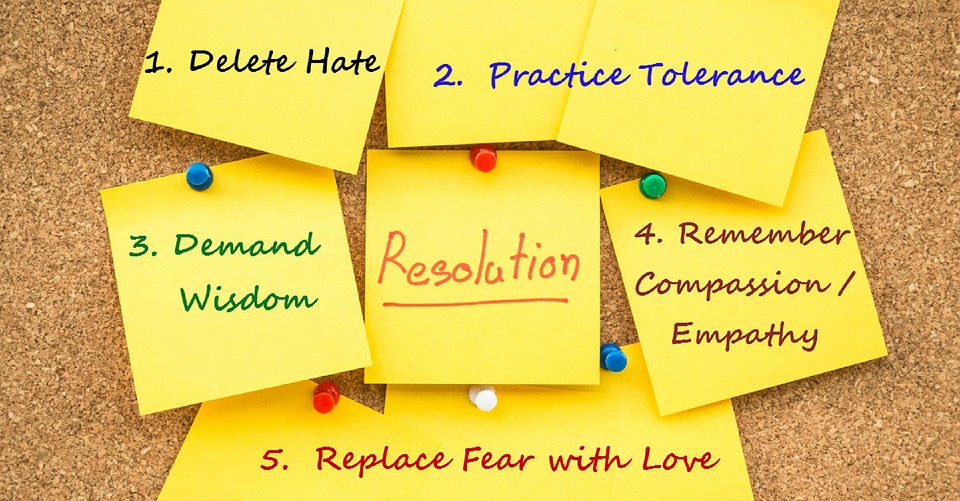I like the concept of national resolutions, and I also like the concept of Jewish nationhood and peoplehood—the kind of borderless connection that inextricably links an ultra-Orthodox Jew in Azerbaijan with a totally assimilated Jew in Peru. Is it possible for Jews, who can’t seem to agree on anything, to strive for national resolutions as one people? Probably not, given that the first argument would revolve around when to actually make resolutions—in the fall (Rosh Hashanah) or in the winter (Gregorian New Year). Millions of Jews do not even view themselves as part of a greater people, shunning such a belief as a ghettoizing relic of the past. That’s a bona fide tragedy.
I see Jews a different way: I often view us through the lenses of our enemies. Can an Islamic Jihad terrorist in the Gaza Strip tell the difference between a secular Jew in Tel Aviv and a traditional one in Haifa? Does an armed white supremacist make sure he’s targeting an Orthodox synagogue as opposed to a Conservative one? Does he actually sit at his computer and Google “Orthodox synagogues near me”? And 20 years ago, didn’t Hezbollah leader Hassan Nasrallah declare, “If Jews all gather in Israel, it will save us the trouble of going after them worldwide”?
Yes, Americans need national resolutions, and American Jews are as American as anyone else. But Am Yisrael, the peoplehood of Jews worldwide, needs its own resolutions. There are many resolutions to be made, depending on whom you ask. But for me, one of the most important Jewish resolutions for 2022 is this one: We need to diversify our outrage policy.
I was frustrated by these two individuals for many reasons, including the fact that they never seemed to express any views on antisemitism. On the day in 2019 that John Timothy Earnest attacked the Chabad of Poway, killing Lori Gilbert-Kaye and injuring others, both of the aforementioned individuals posted about efforts to cancel a few male celebrities who had made inappropriate advances toward women.
Is sounding the alarm on sexual harassment critical? Of course. But I wish many more Jews would diversify their outrage policies and also go after antisemites. Imagine if we put as much effort into getting an antisemite isolated as we do those who deny climate change. Imagine if 10,000 young Israeli Jews, most of them secular, all posted at once about another genocidal tweet by Iran’s antisemitic Supreme Leader Ayatollah Ali Khamenei, and all 10,000 of them reported this murderous fanatic on Twitter the same morning.
Why can’t an atheist Jew in one part of Brooklyn send outraged emails to her elected officials about attacks against haredi Jews in another part of Brooklyn? I’m sure it happens, but not on a mass level.
And why haven’t millions of Jewish college students around the world—not just in the United States—demanded that the University of Southern California take immediate action against someone like Yasmeen Mashayekh, a 21-year-old civil engineering student who tweeted about wanting to “kill every motherf***ing Zionist”? The best part of this story is that Mashayekh serves as a diversity, equity and inclusion senator for the Viterbi Graduate Student Association. For some reason, she didn’t think it was a problem to promote equity and inclusion while also hoping to annihilate a few Zionists here and there. That’s how despised and disposable Jewish lives have been rendered today.
How I would have loved to have seen hundreds of thousands of Jews ask for more nuance from “Harry Potter” star Emma Watson, who this week posted on Instagram about solidarity with the “Free Palestine” movement, rather than peace between Palestinians and Jews. Wouldn’t it be nice if, just once, a celebrity worried about backlash over a tweet that undermined Israel, fearing that millions of Jews would take her to task over her bias? For all the power antisemites claim Jews exert over the world, Jews are truly the least feared people I know (the Israel Defense Forces not included.)
We need greater resolve, and to shout news of antisemitism from the figurative rooftops of all media, including social media. Otherwise, it’s akin to making a resolution to focus on trimming the fat in your thighs when your entire body is up against a systemic disease. For Jews, antisemitism is that systemic disease.
Of course, there are many more resolutions Jews worldwide should consider, including rebuilding and infusing life into our Jewish spaces, such as synagogues that have been eviscerated by the pandemic, and wearing our Jewish identities, regardless of our observance level, with a certain in-your-face pride. But here’s the thing about Jews working together to take down antisemites and those who literally put our lives at risk by demonizing anyone labeled a Zionist: It actually has the power to unite us. Isn’t that a resolution worth keeping?
Tabby Refael is a Los Angeles-based writer, speaker and civic-action advocate. Follow her on Twitter @RefaelTabby
This article first appeared in the Jewish Journal.

























